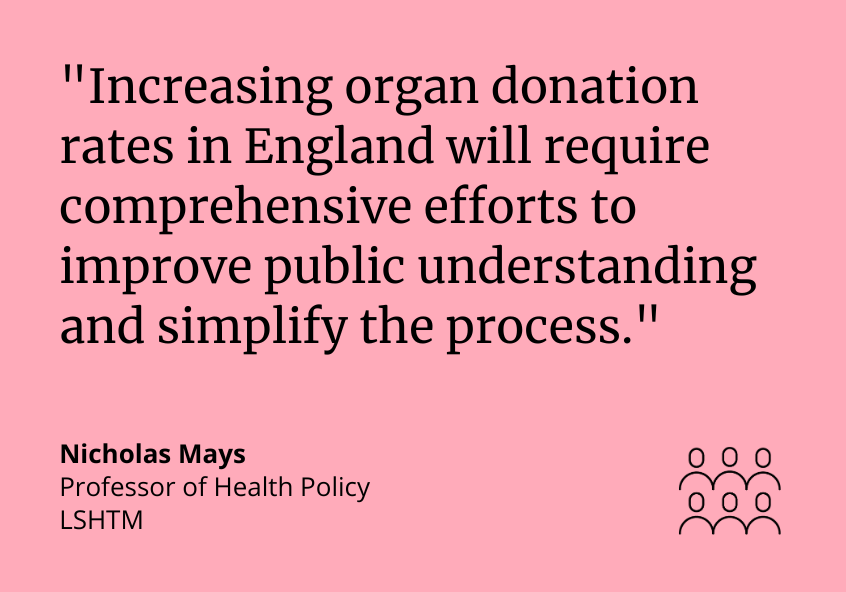England’s organ donation law: Why the ‘soft’ opt-out system has fallen short and what can be done to improve it
London School of Hygiene & Tropical Medicine https://lshtm.ac.uk/themes/custom/lshtm/images/lshtm-logo-black.png Friday 15 November 2024
Professor Nicholas Mays quote: Increasing organ donation rates in England will require comprehensive efforts to improve public understanding and simplify the process.
In May 2020, England introduced a "soft" opt-out system for organ donation, following the earlier adoption of similar legislation in Wales (2015) and later Scotland (2021). The goal was to increase organ availability by presuming most adults to be willing donors unless they explicitly opted out. However, several years on, the anticipated improvements in organ donation rates have not materialised, and the implementation of the law has been shown to be more complicated than proponents had expected.
What we did
The Policy Innovation and Evaluation Research Unit (PIRU) at the London School of Hygiene & Tropical Medicine (LSHTM), in collaboration with Bangor University, conducted a comprehensive evaluation between 2020 and 2023. This included an analysis of public opinion, healthcare practices, and the experiences of families and healthcare professionals involved in organ donation.
Why reality fell short
We identified several areas where there were significant problems with the current opt-out approach.
Before the law was changed in 2019 people had to opt-in, by providing explicit consent for their organs to be donated. The new opt-out approach presumed everyone to consent to donation, but was implemented within the existing framework, leading to a hybrid, and often poorly understood “soft” opt-out system.
Our research found that families continued to be central to the decision-making process, often overriding the presumed consent, and thereby undermining the law’s intent. This “soft” opt-out approach was chosen to avoid concerns of state overreach. In practice, it resulted in families overruling both presumed consent and explicit consent.
Moreover, it has become clear, that many people do not fully understand what presumed consent means, often equating it with less commitment to donating than an explicit opt-in decision. Misinformation campaigns, particularly targeting ethnic minorities, have created further confusion, and led to higher opt-out rates within these communities.
Lastly, the new law was introduced at the peak of the COVID-19 pandemic, when healthcare resources were already stretched and unable to prioritise organ donation.
What needs to change?
The presumed consent system for organ donation in England has been limited by existing laws, especially the Human Tissue Act (HTA). This law requires specific consent for each type of organ, tissue and use not covered under the presumed consent rules. This adds complexity to the work of specialist staff in organ donation who have to work with two forms of consent pulling in different directions. This lengthens discussions with bereaved families and heightens the risk of error.
Building and sustaining public trust is essential. The public must understand that organ donation does not compromise end-of-life care. Organ donation remains low-profile within the NHS, largely disconnected from broader end-of-life care conversations. A cultural shift is necessary — one that incorporates organ donation as a routine and expected consideration within end-of-life care. This would help to reduce the emotional shock families experience when confronted with organ donation during acute grief.
Simplifying the consent process and making organ donation a seamless part of end-of-life care is critical. This requires avoiding further reactive legislation. The current HTA Act was created in the wake of a scandal widely regarded to have harmed trust in the NHS. Instead, healthcare professionals should be empowered to implement meaningful changes. Ensuring that all relevant staff, not just specialists in organ donation, are adequately prepared and equipped to facilitate organ donation when the opportunity arises will enhance both the system's efficiency and effectiveness, benefiting donors and recipients alike.
Ultimately, the success of England’s opt-out system will depend on more than legal reforms. Increasing organ donation rates will require a comprehensive effort to enhance public understanding, for example through new media campaigns to help explain the changed role of the family, and demystify the processes involved in organ donation. It will also need a strengthening of healthcare infrastructure by ensuring that organ donation is suitably resourced and providing clearer guidance for families and professionals navigating what remains a highly sensitive and challenging process, by making it a priority for everyone.
This study was funded by the NIHR Policy Research Programme through its core support to the Policy Innovation and Evaluation Research Unit (Project No: PR-PRU-1217-20602). The views expressed are those of the author(s) and are not necessarily those of the NIHR or the Department of Health and Social Care
If you enjoyed this article and would like to build a career in global health, we offer a range of MSc programmes covering health and data, infectious and tropical diseases, population health, and public health and policy.
Available on campus or online, including flexible study that works around your work and home life, be part of a global community at the UK's no.1 public health university.
